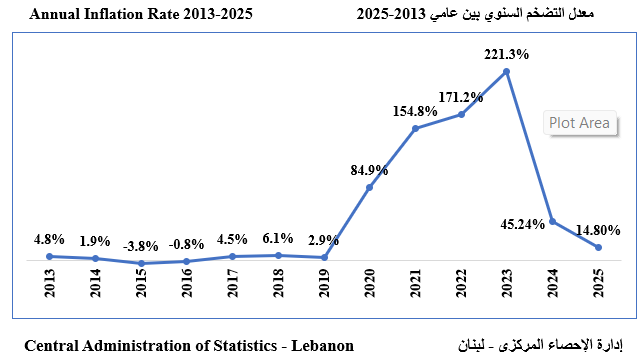
Gender Equality in Lebanon
|
How far are we from Gender Equality in Lebanon? A gender statistical report in partnership between CAS and UNDP highlights how gender disaggregated data could help mainstream gender in national policies and in tracking progress towards achieving gender parity. The report is available in English (PDF).
|
Economic statistics
Economic Surveys
This section provides Economic statistics indicators from surveys conducted by the Central Administration of Statistics (CAS).
Consumer Price Index CPI
Inflation in figures (PDF Format)
(PDF Format) التضخم بالأرقام
Annual Average Inflation (PDF Format)
بلغ معدل التضخم السنوي سنة 2025 % 14.80حسب دراسة مؤشر أسعار الإستهلاك الصادرة عن إدارة الإحصاء المركزي.
بلغ معدل التضخم السنوي سنة 2024 % 45.24 حسب دراسة مؤشر أسعار الإستهلاك الصادرة عن إدارة الإحصاء المركزي.
بلغ معدل التضخم السنوي لسنة 2023 %221.3 حسب دراسة مؤشر أسعار الإستهلاك الصادرة عن إدارة الإحصاء المركزي.
بلغ معدل التضخم السنوي لسنة 2022 %171.2 حسب دراسة مؤشر أسعار الإستهلاك الصادرة عن إدارة الإحصاء المركزي.
بلغ معدل التضخم السنوي لسنة 2021 %154.8 حسب دراسة مؤشر أسعار الإستهلاك الصادرة عن إدارة الإحصاء المركزي.
بلغ معدل التضخم السنوي سنة 2020 %84.9 حسب دراسة مؤشر أسعار الإستهلاك الصادرة عن إدارة الإحصاء المركزي
You can Download results of the Consumer Price Index (CPI).
قراءة مبسطة في مؤشر اسعار الاستهلاك
Consumer Price Index - CPI
CPI Results: 2025 - 2024 - 2023 - 2022 - 2021 - 2020 - 2019 - 2018 - 2017 - 2016 - 2015 - 2014 - 2013 - 2012 - 2011 - 2010 - 2009 - 2008
The Consumer Price Index (CPI) is one of the most important economic and social indicators in a country. It gives an overall image of the evolution of prices of goods and services consumed by households. CPI is also used to measure the impact of price evolution on the living standards of individuals and households and other social and economic indicators.
The Central Administration of Statistics (CAS) has published a quarterly CPI since 1999 (1998-2007) with the technical assistance of IMF. In 2007, CAS decided to improve the CPI on multiple levels:
· Updating the weights used to calculate the new CPI based on the “The National Survey of Household Living Conditions 2004-2005”.
· Increasing the number and frequency of collected prices of goods from all Lebanese regions instead of collecting prices only Beirut and its suburbs
· Building special software by CAS for price data entry, editing and publishing results.
· Collecting prices with the help of PDA-s.
· Publishing a monthly CPI in the first working day after the 20th of each month.
As usual, CPI will be publishing to all users in the private and public sectors and on CAS webpage and in newspapers and magazines.
Cooperation with the Middle East Technical Assistance Center (METAC)
An international expert followed up the updating of the 2008 CPI on all levels throughout 5 missions in 2007 financed by the Middle East Technical Assistance Centre-IMF.
In 2007, the results of “The National Survey of Household Budget Survey 2004-2005” conducted by CAS were being revised. And accordingly CAS identified the list of goods and services constituting the fixed CPI basket which is used for the CPI calculation. For this purpose, CAS conducted several surveys on all Lebanese territory using specially developed questionnaires for the collection of available goods specifications in the Lebanese market. Thus resulting a sample of goods and services constituting the new CPI basket by taking into consideration the items in the old consumer basket. At the same time, CAS chose the point of sales where the prices should be collected from. It consisted of more than 2000 point of sales for the purpose of compiling the monthly prices of 50000 goods.
CAS built a “self automated process” software developed by CAS employees without any external technical assistance. This software included secondary softwares ensuring the electronic distribution of points of sales among the Price Collectors. Other softwares were developed for price data entry using PC-s, a multilevel data editing, computations of CPI and finally publishing the results.
CPI consists of 12 time series. That were especially designed to measure the annual and monthly inflation of prices of all CPI goods purchased by households.
CAS uses weights extracted from the “The National Survey of Household Living Conditions and budget 2004-2005”. These weights show the average household’s expenditures on goods and services and not taking into account the household’s size, income and social status. Thus, these weights do not represent at all the expenditures of a typical average household in Lebanon.
The current CPI basket is divided into 12 divisions according to “The Classification of Individual Consumption by Purpose” as published by UN. The following table compares the current weights with the previous weights used to calculate the former CPI:
|
Expenditure Division |
2004 weights in percentage |
2012 weights in percentage |
|
Foods and Non-Alcoholic Beverages |
19.9 |
20.0 |
|
Alcoholic Beverages, Tobacco and Narcotics |
2.1 |
1.4 |
|
Clothing and Footwear |
6.2 |
5.2 |
|
Housing, Water, Electricity, Gas and other Fuels (including rents) |
25.7 |
28.4 |
|
Furnishing, Household Equipment & Routine Household Maintenance |
3.9 |
3.8 |
|
Health |
6.8 |
7.7 |
|
Transport |
12.3 |
13.1 |
|
Communication |
4.8 |
4.5 |
|
Recreation and Culture |
3.7 |
2.4 |
|
Education |
7.7 |
6.6 |
|
Restaurants and Hotels |
2.7 |
2.8 |
|
Miscellaneous Goods & Services |
4.2 |
4.1 |
Computing CPI
CPI is computed in Lebanon by using the Geometric Laspeyers equation

This equation represents the weighted geometric average for CPI on expenditure divisions level.
Relation between the old and the new CPI
The new base month for CPI is December 2013. Thus, the monthly CPIs will be computed relying on this base month. The new CPI aims like CAS efforts to provide new economic indicators with high quality. It is also an extension of the CPI publishing by CAS since 1999.
Inflation in figures (PDF Format)
(PDF Format) التضخم بالأرقام
| 2025 | 2024 | 2023 | 2022 | 2021 | 2020 | 2019 | 2018 | 2017 | 2016 | 2015 | 2014 | 2013 | 2012 | 2011 | 2010 | 2009 | 2008 | |
| January |
- XLS
|
- XLS |
- XLS
|
- XLS |
- XLS
|
- XLS |
- XLS
|
- XLS |
- XLS
|
- XLS |
PDF -XLS - Annex |
- Annex |
XLS * |
- XLS |
PDF - XLS * | |||
| February |
- XLS |
- XLS |
- XLS |
- XLS |
- XLS
|
- XLS
|
- XLS |
- XLS |
- XLS |
- XLS |
PDF - XLS * |
- XLS |
||||||
| March |
- XLS
|
- XLS
|
- XLS
|
- XLS |
- XLS |
- XLS
|
- XLS
|
- XLS |
-XLS |
- XLS |
- Annex |
PDF - XLS* |
- XLS |
|||||
| April |
- XLS
|
- XLS |
- XLS |
- XLS
|
- XLS
|
- XLS
|
- XLS |
- XLS |
-XLS |
- XLS |
- Annex |
PDF - XLS * |
- XLS |
|||||
| May |
- XLS
|
- XLS
|
- XLS
|
- XLS
|
- XLS
|
- XLS
|
PDF- |
- XLS |
-XLS |
-XLS |
PDF -XLS - Annex |
- Annex |
PDF- XLS * |
- XLS |
||||
| June |
- XLS
|
- XLS
|
- XLS
|
- XLS
|
- XLS
|
- XLS |
PDF- |
- XLS |
-XLS |
-XLS |
- Annex |
- XLS |
- XLS |
|||||
| July |
- XLS
|
- XLS |
- XLS
|
- XLS
|
- XLS
|
- XLS
|
PDF-
|
- XLS |
-XLS |
-XLS |
- Annex |
- XLS |
- XLS |
|||||
| August |
- XLS
|
- XLS
|
- XLS
|
- XLS
|
- XLS |
- XLS
|
PDF-
|
- XLS |
-XLS |
-XLS |
- Annex |
- Annex |
- XLS |
- XLS |
||||
| September |
- XLS
|
- XLS
|
- XLS
|
- XLS
|
- XLS |
- XLS
|
- XLS
|
- XLS |
PDF- |
-XLS |
- Annex |
- Annex |
- XLS |
- XLS |
PDF - XLS | |||
| October |
- XLS
|
- XLS
|
- XLS
|
- XLS
|
- XLS
|
- XLS
|
- XLS |
- XLS
|
PDF- |
PDF - |
- Annex |
- XLS |
- XLS |
PDF - XLS | - | |||
| November |
- XLS
|
- XLS
|
- XLS
|
- XLS |
- XLS
|
- XLS
|
- XLS
|
- XLS |
PDF-
|
PDF - |
- Annex |
- XLS |
- XLS |
PDF - XLS | ||||
| December |
- XLS
|
- XLS |
- XLS
|
- XLS |
- XLS
|
- XLS
|
- XLS |
- XLS |
PDF-
|
PDF - |
- Annex |
- XLS |
PDF - XLS | PDF - XLS |
*: interpolated index





